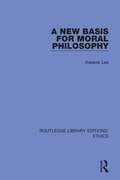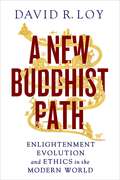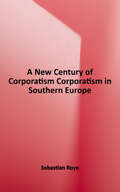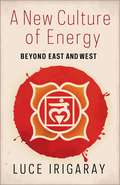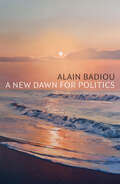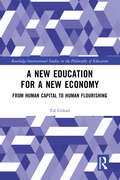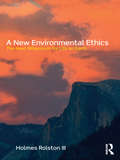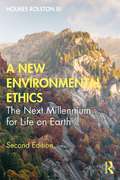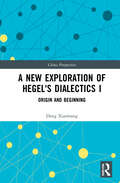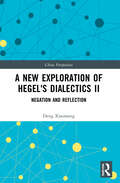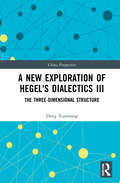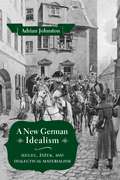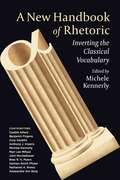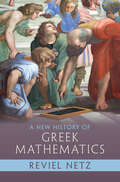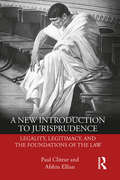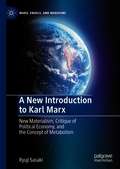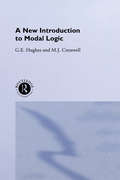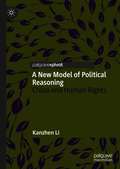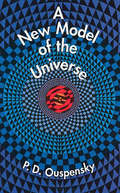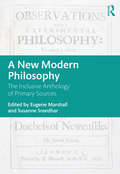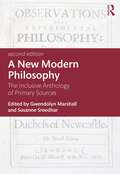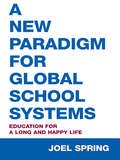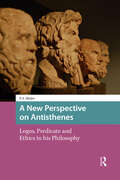- Table View
- List View
A New Basis for Moral Philosophy
by Keekok LeeOriginally published in 1985, this book establishes that moral discourse is critical, rational and objective and challenges the ideology of value irrationalism behind contemporary liberalism. The book discusses the origins of the fact/value distinction, and calls into question the thesis that logical derivability or strict implication is the only legitimate relationship between propositions. A straightforward philosophical treatment of the subject, in the analytical tradition, it will be especially useful for undergraduate students.
A New Buddhist Path
by David R. LoyEngage with a new vision of Buddhism and the modern world with the bestselling author of Money Sex War Karma: Notes for a Buddhist Revolution.David R. Loy addresses head-on the most pressing issues of Buddhist philosophy in our time. What is the meaning of enlightenment--is it an escape from the world, or is it a form of psychological healing? How can one reconcile modern scientific theory with ancient religious teachings? What is our role in the universe? Loy shows us that neither Buddhism nor secular society by itself is sufficient to answer these questions. Instead, he investigates the unexpected intersections of the two. Through this exchange, he uncovers a new Buddhist way, one that is faithful to the important traditions of Buddhism but compatible with modernity. This way, we can see the world as it is truly is, realize our indivisibility from it, and learn that the world's problems are our problems. This is a new path for a new world.
A New Buddhist Path: Enlightenment, Evolution, and Ethics in the Modern World
by David R. LoyEngage with a new vision of Buddhism and the modern world with the bestselling author of Money Sex War Karma: Notes for a Buddhist Revolution.David R. Loy addresses head-on the most pressing issues of Buddhist philosophy in our time. What is the meaning of enlightenment--is it an escape from the world, or is it a form of psychological healing? How can one reconcile modern scientific theory with ancient religious teachings? What is our role in the universe? Loy shows us that neither Buddhism nor secular society by itself is sufficient to answer these questions. Instead, he investigates the unexpected intersections of the two. Through this exchange, he uncovers a new Buddhist way, one that is faithful to the important traditions of Buddhism but compatible with modernity. This way, we can see the world as it is truly is, realize our indivisibility from it, and learn that the world's problems are our problems. This is a new path for a new world.
A New Century of Corporatism?: Corporatism in Southern Europe--Spain and Portugal in Comparative Perspective
by Sebastian RoyoThe author examines how national-level social bargaining was established in Portugal and Spain during the last two decades, despite unpropitious institutional and structural conditions. He argues that this development was the result of the reorientation of the strategies of the social actors. With their support for these macro-economic agreements, labor unions sought to participate in labor and economic reforms and avoid the implementation of unilateral policies on the part of governments, while mitigating the decline in their bargaining power at the workplace level. <p><p>In addition, he contends that a process of institutional learning and increasing autonomy by unions from political parties, particularly in Spain, have further enhanced social dialogue and led the social actors to conclude that previous confrontational strategies were detrimental to the interests of their constituencies and threatened their own survival. The author claims that the emergence of new institutions to promote tripartite social bargaining in both countries resulted in the institutionalization of the bargaining process and contributed to a transformation in the pattern of industrial relations. Of particular interest to scholars and researchers involved with Iberian politics, labor, and political economy.
A New Culture of Energy: Beyond East and West
by Luce IrigarayIn A New Culture of Energy, Luce Irigaray reflects on three critical concerns of our time: the cultivation of energy in its many forms, the integration of Asian and Western traditions, and the reenvisioning of religious figures for the contemporary world. A philosopher as well as a psychoanalyst, Irigaray draws deeply on her personal experience in addressing these questions. In her view, although psychoanalysis can succeed in releasing mental energy, it fails to support physical and spiritual well-being. In pursuit of an alternative, she took up the bodily practices of yoga and pranayama breathing, which she considers in light of her analysis of sexuate belonging and difference. Reflecting on these practices, Irigaray contrasts yoga’s approach to the natural world with how the Western tradition privileges mastery over nature. These varied sources provoke her to question how a tradition imagines transcendence and the divine. In the book’s final section, she reinterprets the figure of Mary through breath, self-affection, and touch, recalibrating her physicality within a natural world. A reflection on the liberation of human energy, this book urges us to cultivate an evolutionary culture in harmony with all living beings.
A New Dawn for Politics
by Alain BadiouWhat is the relation between politics and the world? It might seem that global capitalism has created one world, but this is an illusion because capitalism creates a world of objects and money that divides human existence into regions separated by fences and walls built to keep some people out. In place of this falsely unified world of global capitalism, we need to assert a fundamental principle – namely, that there is one world of living subjects. This, in Badiou&’s view, is the categorical imperative of all true politics. The one world of living subjects is the place where an infinity of differences and identities exist. Hence foreigners are not a problem but rather an opportunity and a gift. They bear witness to the youth of the world in its infinite variety, and it is with this youth that the politics of the future rests. Foreignness is the means by which existence is re-evaluated, and all true politics is a new dawn of existence. This collection of essays by Badiou, in which he draws out the political implications of recent events and social movements, will be of value to anyone interested in the great social and political questions of our time.
A New Education for a New Economy: From Human Capital to Human Flourishing (Routledge International Studies in the Philosophy of Education)
by Tal GileadProviding an in-depth, novel analysis of education’s role in today’s economy by scrutinizing its theoretical underpinnings, this volume critiques the suitability of the current, dominant economic framework for education and for shaping educational policymaking worldwide.Critically examining the history and philosophy that underpin our present societal understanding of the link between economics and education, the book argues for an urgent redefining of education’s role in the economy based on intellectual foundations that significantly differ from our current, dominant conceptions. Across seven chapters, the book posits that the adoption of a new philosophical framework, the reshaping of economic and educational aims, and the adjustment of our educational system are each necessary to better promote human flourishing.Ultimately providing a platform to entirely reconsider the idea that the primary aim of education is to serve the economic system – in particular, economic growth – this book will appeal to scholars, researchers, and postgraduate students studying educational policy, the philosophy of education, and the history of education more broadly. Education policymakers and academics studying education and the economy may also find this book of interest.
A New Environmental Ethics: The Next Millennium for Life on Earth
by Holmes Rolston IIINo one looking ahead at the middle of the last century could have foreseen the extent and the importance of the ensuing environmental crises. Now, more than a decade into the next century, no one can ignore it. A New Environmental Ethics: the Next Millennium for Life on Earth offers clear, powerful, and oftentimes moving thoughts from one of the first and most respected philosophers to write on the environment. Rolston, an early and leading pioneer in studying the moral relationship between humans and the earth, surveys the full spectrum of approaches in the field of environmental ethics. This book, however, is not simply a judicious overview. Instead, it offers critical assessments of contemporary academic accounts and draws on a lifetime of research and experience to suggest an outlook for the future. As a result, this focused, forward-looking analysis will be a necessary complement to any balanced textbook or anthology in environmental ethics, and will teach its readers to be responsible global citizens, and residents of their landscape, helping ensure that the future we have will be the one we wish for.
A New Environmental Ethics: The Next Millennium for Life on Earth
by Holmes Rolston IIIThis Second Edition of A New Environmental Ethics: The Next Millennium for Life on Earth offers clear, powerful, and often moving thoughts from Holmes Rolston III, one of the first and most respected philosophers to write on the environment and often called the "father of environmental ethics." Rolston surveys the full spectrum of approaches in the field of environmental ethics and offers critical assessments of contemporary academic accounts. He draws on a lifetime of research and experience to suggest an outlook, and even hope, for the future. This forward-looking analysis, focused on the new millennium, will be a necessary complement to any balanced textbook or anthology in environmental ethics. The First Edition guaranteed "to put you in your place." Beyond that, the Second Edition asks whether you want to live a "de-natured life on a de-natured planet." Key Updates in the Second Edition Covers the worsening environmental situation due to actions of the Trump administration, including withdrawal from the Paris Agreement and from the U.N. Framework Convention on Climate Change Includes information on legislation in key U.S. states (e.g., California and New York) aimed to ameliorate the damage done at the federal level Increases coverage of group knowledge, group agreement and disagreement, and group action in collective environmental ethics, as distinguished from individual knowledge and action Examines the deleterious effects of online consumer behavior Explains how a loss of solidarity among a nation’s citizens and even a larger solidary among humanity leads to environmental degradation Offers new analysis of the effects of epistemic bubbles, echo chambers, and fake news on the behavior of voters and consumers Provides an extended critique of the Anthropocene Epoch, and the prospect of geo-engineering Earth to become a synthetic environment.
A New Exploration of Hegel's Dialectics I: Origin and Beginning (China Perspectives)
by Deng XiaomangThis volume reinterprets Hegelian dialectics via an exploration of the two origins of dialectics and illuminates how they constitute the inner tension at the heart of the philosophical system, developing into the forms of thought that fashion the history of western philosophy.As the first volume of a three-volume set that gives insights into Hegel's dialectics and thereby his overall philosophical thought, the book considers the linguistics spirit of logos and the existentialist spirit of nous in Greek philosophy as the two origins of Hegelian dialectics. The author argues that the two spirits form a dialectical unity of opposites and constitute the inner tension at the heart of the belief system. Based on this tension, this volume explains Hegel's problem of beginning that has the sense composed of both the starting point of logic and that of consciousness. Beginning in this twofold sense shapes dimensions of his methodology: immediacy and mediacy, the path of doubt and the path of truth, the linguistics lever and the existential lever.The title will appeal to scholars and students interested in Hegel and Marx's philosophy, German classical philosophy and Western philosophy.
A New Exploration of Hegel's Dialectics II: Negation and Reflection (China Perspectives)
by Deng XiaomangFocusing on the self-negation and reflective forms of Hegel's dialectics, and representing the spirit of nous and logos respectively, this volume explores core functions in the subjectivity, free spirit and practicality of Hegelian dialectics.As the second volume of a three-volume set that gives insights into Hegel's dialectics and thereby his overall philosophical thought, the book proposes and discusses the soul and form of Hegelian dialectics. As the soul of Hegel's dialectics, which represents the spirit of nous, self-negation plays a fundamental role in Hegel's philosophy, and all other dialectical laws derive from this core principle, with which the subjectivity and free spirit of Hegel's dialectics take shape along with their essential practicality. The form of expression belonging to this negative dialectic as such is the reflective mode of thinking that represents the spirit of logos, and it is this reflective mode of thinking that follows the logical procedure of "reflecting on reflection," rendering the progression of Hegel's dialectical subject lawful, rational and logical. The title will appeal to scholars and students interested in Hegel's and Marx's philosophy, German classical philosophy and Western philosophy.
A New Exploration of Hegel's Dialectics III: The Three-Dimensional Structure (China Perspectives)
by Deng XiaomangThis volume explores the unity of logic, epistemology and ontology in Hegel's dialectic and the interrelation among the three, thereby revealing the internal features of Hegel's dialectic as well as the connection and divergence between Hegel's and Marx's philosophical thought.As the final volume of a three-volume set that gives insights into Hegel's dialectic and his overall philosophical thought, the book analyzes Hegel's dialectic as "a unity of three." As logic, it transcends language and is therefore epistemology; as epistemology, it transcends theory and is therefore ontology; as ontology, it transcends existing things and is therefore logic. Hegel's dialectic thus demonstrates itself as the revolutionary development of each of these three fields in the history of Western philosophy. The principle of the agreement of logic with history thereby expressed immediately becomes one of the most important philosophical sources of inspiration for Marx's historical materialism. A more profound understanding of Hegel's philosophy will therefore deepen our understanding of the philosophy of Marxism.The title will appeal to scholars and students interested in Hegel's and Marx's philosophy, German classical philosophy and Western philosophy.
A New German Idealism: Hegel, Žižek, and Dialectical Materialism
by Adrian JohnstonIn 2012, philosopher and public intellectual Slavoj Žižek published what arguably is his magnum opus, the one-thousand-page tome Less Than Nothing: Hegel and the Shadow of Dialectical Materialism. A sizable sequel appeared in 2014, Absolute Recoil: Towards a New Foundation of Dialectical Materialism. In these two books, Žižek returns to the German idealist G. W. F. Hegel in order to forge a new materialism for the twenty-first century. Žižek’s reinvention of Hegelian dialectics explores perennial and contemporary concerns: humanity’s relations with nature, the place of human freedom, the limits of rationality, the roles of spirituality and religion, and the prospects for radical sociopolitical change.In A New German Idealism, Adrian Johnston offers a first-of-its-kind sustained critical response to Less Than Nothing and Absolute Recoil. Johnston, a leading authority on and interlocutor of Žižek, assesses the recent return to Hegel against the backdrop of Kantian and post-Kantian German idealism. He also presents alternate reconstructions of Hegel’s positions that differ in important respects from Žižek’s version of dialectical materialism. In particular, Johnston criticizes Žižek’s deviations from the secular naturalism and Enlightenment optimism of his chosen sources of inspiration: not only Hegel, but Karl Marx and Sigmund Freud too. In response, Johnston develops what he calls transcendental materialism, an antireductive and leftist materialism capable of preserving and advancing the core legacies of the Hegelian, Marxian, and Freudian traditions central to Žižek.
A New Handbook of Rhetoric: Inverting the Classical Vocabulary
by Michele KennerlyLike every discipline, Rhetorical Studies relies on a technical vocabulary to convey specialized concepts, but few disciplines rely so deeply on a set of terms developed so long ago. Pathos, kairos, doxa, topos—these and others originate from the so-called classical world, which has conferred on them excessive authority. Without jettisoning these rhetorical terms altogether, this handbook addresses critiques of their ongoing relevance, explanatory power, and exclusionary effects.A New Handbook of Rhetoric inverts the terms of classical rhetoric by applying to them the alpha privative, a prefix that expresses absence. Adding the prefix α- to more than a dozen of the most important terms in the field, the contributors to this volume build a new vocabulary for rhetorical inquiry. Essays on apathy, akairos, adoxa, and atopos, among others, explore long-standing disciplinary habits, reveal the denials and privileges inherent in traditional rhetorical inquiry, and theorize new problems and methods. Using this vocabulary in an analysis of current politics, media, and technology, the essays illuminate aspects of contemporary culture that traditional rhetorical theory often overlooks.Innovative and groundbreaking, A New Handbook of Rhetoric at once draws on and unsettles ancient Greek rhetorical terms, opening new avenues for studying values, norms, and phenomena often stymied by the tradition.In addition to the editor, the contributors include Caddie Alford, Benjamin Firgens, Cory Geraths, Anthony J. Irizarry, Mari Lee Mifsud, John Muckelbauer, Bess R. H. Myers, Damien Smith Pfister, Nathaniel A. Rivers, and Alessandra Von Burg.
A New Handbook of Rhetoric: Inverting the Classical Vocabulary
by Michele KennerlyLike every discipline, Rhetorical Studies relies on a technical vocabulary to convey specialized concepts, but few disciplines rely so deeply on a set of terms developed so long ago. Pathos, kairos, doxa, topos—these and others originate from the so-called classical world, which has conferred on them excessive authority. Without jettisoning these rhetorical terms altogether, this handbook addresses critiques of their ongoing relevance, explanatory power, and exclusionary effects.A New Handbook of Rhetoric inverts the terms of classical rhetoric by applying to them the alpha privative, a prefix that expresses absence. Adding the prefix α- to more than a dozen of the most important terms in the field, the contributors to this volume build a new vocabulary for rhetorical inquiry. Essays on apathy, akairos, adoxa, and atopos, among others, explore long-standing disciplinary habits, reveal the denials and privileges inherent in traditional rhetorical inquiry, and theorize new problems and methods. Using this vocabulary in an analysis of current politics, media, and technology, the essays illuminate aspects of contemporary culture that traditional rhetorical theory often overlooks.Innovative and groundbreaking, A New Handbook of Rhetoric at once draws on and unsettles ancient Greek rhetorical terms, opening new avenues for studying values, norms, and phenomena often stymied by the tradition.In addition to the editor, the contributors include Caddie Alford, Benjamin Firgens, Cory Geraths, Anthony J. Irizarry, Mari Lee Mifsud, John Muckelbauer, Bess R. H. Myers, Damien Smith Pfister, Nathaniel A. Rivers, and Alessandra Von Burg.
A New History of Greek Mathematics
by Reviel NetzThe ancient Greeks played a fundamental role in the history of mathematics and their ideas were reused and developed in subsequent periods all the way down to the scientific revolution and beyond. In this, the first complete history for a century. Reviel Netz offers a panoramic view of the rise and influence of Greek mathematics and its significance in world history. He explores the Near Eastern antecedents and the social and intellectual developments underlying the subject's beginnings in Greece in the fifth century BCE. He leads the reader through the proofs and arguments of key figures like Archytas, Euclid and Archimedes, and considers the totality of the Greek mathematical achievement which also includes, in addition to pure mathematics, such applied fields as optics, music, mechanics and, above all, astronomy. This is the story not only of a major historical development, but of some of the finest mathematics ever created.
A New Introduction to Jurisprudence: Legality, Legitimacy and the Foundations of the Law
by Paul Cliteur Afshin EllianA New Introduction to Jurisprudence takes one of the central problems of law and jurisprudence as its point of departure: what is the law? Adopting an intermediate position between legal positivism and natural law, this book reflects on the concept of ‘liberal democracy’ or ‘constitutional democracy’. In five chapters the book analyses: (i) the idea of higher law, (ii) liberal democracy as a legitimate model for the state, (iii) the separation of church and state or secularism as essential for the democratic state, (iv) the universality of higher law principles, (v) the history of modern political thought. This interdisciplinary approach to jurisprudence is relevant for legal scholars, philosophers, political theorists, public intellectuals, historians, and politicians.
A New Introduction to Karl Marx: New Materialism, Critique of Political Economy, and the Concept of Metabolism (Marx, Engels, and Marxisms)
by Ryuji SasakiThis book provides a concise overview of Marx’s philosophy and political economy, tracing various changes of his theoretical views over time through his practical and theoretical engagements with contradictions of capitalism from the unique perspective of Japanese Marxism. While it offers an objective introduction to Marx’s critique of capitalism, Sasaki uniquely pays particular attention to the concept of “metabolism,” whose disruption under the capitalist mode of production causes exhaustion of labour-power as well as natural resources. Sasaki reconstructs Marx as a revolutionary thinker, whose devoted his entire life for the sake of establishing a more free and equal society beyond capitalism. Sasaki’s book shows that Marx’s passion for the socialist revolution in his last years is recorded in his late excerpt notebooks that become available through the Marx-Engels-Gesamtausgabe.
A New Introduction to Modal Logic
by M.J. Cresswell G.E. HughesThis long-awaited book replaces Hughes and Cresswell's two classic studies of modal logic: An Introduction to Modal Logic and A Companion to Modal Logic.A New Introduction to Modal Logic is an entirely new work, completely re-written by the authors. They have incorporated all the new developments that have taken place since 1968 in both modal propositional logic and modal predicate logic, without sacrificing tha clarity of exposition and approachability that were essential features of their earlier works.The book takes readers from the most basic systems of modal propositional logic right up to systems of modal predicate with identity. It covers both technical developments such as completeness and incompleteness, and finite and infinite models, and their philosophical applications, especially in the area of modal predicate logic.
A New Model of Political Reasoning: China and Human Rights
by Kanzhen LiWhy politics and international relations “seem” to be driven by power/strategies in some conditions but “seem” to be attached to values/beliefs in other situations? Based on findings in (political) psychology and international relations, the book builds a new political reasoning model: a two-layered motivation-heuristic complex. The model grasps the internal mechanism that drives the co-existent and dynamic relationship between material and ideational considerations in making political choices/phenomena diverse and evolving across situations and periods. Applied to the case of China and human rights, the model helps understand several questions that attract those who are interested in the topic: e.g., the roots and contents of strategic and conceptual factors that continuously influence China’s human rights idea/policies; if, why and how the strategy-ideational relationships in such idea/policies evolve across periods; and the role that China's national security condition and external pressure play during such evolving relationships.
A New Model of the Universe
by P. D. OuspenskyAlong with Aleister Crowley, Madame Blavatsky, and George Gurdjieff, P. D. Ouspensky (1878 –1947) was one of the most important and influential figures in the occult movements of the twentieth century. With such books as The Fourth Dimension (incorporated in this present volume), Tertium Organum, In Search of the Miraculous, and The Psychology of Man's Possible Evolution, he earned a loyal following among those seeking a deeper knowledge of themselves and their lives, and of the meaning of human existence.In the present book, Ouspensky analyzes certain older schools of thought, of both East and West, connects them with modern ideas and explains them in the light of twentieth-century discovery and speculations in physics and philosophy. In the process he explores relativity, the fourth dimension, Christian symbolism, the tarot, yoga, dreams, hypnotism, eternal recurrence, and various psychological theories.The book closes with an examination of the role of sex in the evolution of man toward superman. Anyone interested in the occult, mysticism and the relationship of those elements to scientific developments in the modern world will find much to ponder in these stimulating, thought-provoking pages.
A New Modern Philosophy: The Inclusive Anthology of Primary Sources
by Eugene Marshall and Susanne SreedharThe seventeenth and eighteenth centuries are arguably the most important period in philosophy’s history, given that they set a new and broad foundation for subsequent philosophical thought. Over the last decade, however, discontent among instructors has grown with coursebooks’ unwavering focus on the era’s seven most well-known philosophers—all of them white and male—and on their exclusively metaphysical and epistemological concerns. While few dispute the centrality of these figures and the questions they raised, the modern era also included essential contributions from women—like Margaret Cavendish, Elisabeth of Bohemia, Mary Wollstonecraft, and Émilie Du Châtelet—as well as important non-white thinkers, such as Anton Wilhelm Amo, Julien Raimond, and Ottobah Cugoano. At the same time, there has been increasing recognition that moral and political philosophy, philosophy of the natural world, and philosophy of race—also vibrant areas of the seventeenth and eighteenth centuries—need to be better integrated with the standard coverage of metaphysics and epistemology.A New Modern Philosophy: The Inclusive Anthology of Primary Sources addresses—in one volume—these valid criticisms. Weaving together multiple voices and all of the era’s vibrant areas of debate, this volume sets a new agenda for studying modern philosophy. It includes a wide range of readings from 34 thinkers, integrating essential works from all of the canonical writers along with the previously neglected philosophers. Arranged chronologically, editors Eugene Marshall and Susanne Sreedhar provide an introduction for each author that sets the thinker in his or her time period as well as in the longer debates to which the thinker contributed. Study questions and suggestions for further reading conclude each chapter. At the end of the volume, in addition to a comprehensive subject index, the book includes 13 Syllabus Modules, which will help instructors use the book to easily set up different topically structured courses, such as "The Citizen and the State," "Mind and Matter," "Education," "Theories of Perception," or "Metaphysics of Causation." And an eresource offers a wide range of supplemental online resources, including essay assignments, exams, quizzes, student handouts, reading questions, and scholarly articles on teaching the history of philosophy.
A New Modern Philosophy: The Inclusive Anthology of Primary Sources
by Gwendolyn MarshallThe seventeenth and eighteenth centuries are arguably the most important period in philosophy’s history, given that they set a new and broad foundation for subsequent philosophical thought. Over the last decade, however, discontent among instructors has grown with coursebooks’ unwavering focus on the era’s seven most well-known philosophers—all of them white and male—and on their exclusively metaphysical and epistemological concerns. While few dispute the centrality of these figures and the questions they raised, the modern era also included essential contributions from women—like Margaret Cavendish, Elisabeth of Bohemia, Mary Wollstonecraft, and Émilie Du Châtelet—as well as important non-white thinkers, such as Anton Wilhelm Amo, Julien Raimond, and Ottobah Cugoano. At the same time, there has been increasing recognition that moral and political philosophy, philosophy of the natural world, and philosophy of race—also vibrant areas of the seventeenth and ighteenth centuries—need to be better integrated with the standard coverage of metaphysics and epistemology. The second edition of A New Modern Philosophy: The Inclusive Anthology of Primary Sources addresses—in one volume—these valid criticisms. Weaving together multiple voices and all of the era’s vibrant areas of debate, this volume sets a new agenda for studying modern philosophy. It includes a wide range of readings from 36 thinkers, integrating essential works from all of the canonical writers along with the previously neglected philosophers. Editors Gwendolyn Marshall and Susanne Sreedhar provide an introduction for each author that sets the thinker in his or her time period as well as in the longer debates to which the thinker contributed. Study questions and suggestions for further reading conclude each chapter. At the end of the volume, in addition to a comprehensive subject index, the book includes 13 Syllabus Modules, which will help instructors use the book to easily set up different topically structured courses, such as "The Citizen and the State," "Mind and Matter," "Education," "Theories of Perception," or "Metaphysics of Causation." And an eResource offers a wide range of supplemental online resources, including essay assignments, exams, quizzes, student handouts, reading questions, and scholarly articles on teaching the history of philosophy. Key Updates to the Second Edition: Provides an expanded table of contents and the addition of new chapters on Galileo and Sor Juana Ines De La Cruz Expands readings and coverage in chapters on Spinoza and Descartes Offers improved Syllabus Modules at the back of the book Includes a new Student Introduction Updates bibliographic information
A New Paradigm for Global School Systems: Education for a Long and Happy Life (Sociocultural, Political, And Historical Studies In Education Ser.)
by Joel SpringThis volume—a major new contribution to Joel Spring’s reportage and analysis of the intersection of global forces and education—offers a new paradigm for global school systems. Education for global economic competition is the prevailing goal of most national school systems. Spring argues that recent international studies by econom
A New Perspective on Antisthenes: Logos, Predicate and Ethics in his Philosophy
by Piet MeijerAntisthenes (c. 445- c. 365 BC), was a prominent follower of Socrates and bitter rival of Plato. In this revisionary account of his philosophy in all its aspects, P. A. Meijer claims that Plato and Aristotle have corrupted our perspective on this witty and ingenious thinker. The first part of the book reexamines afresh Antisthenes' ideas about definition and predication and concludes from these that Antisthenes never held the (in)famous theory that contradiction is impossible. The second part of the book argues that Antisthenes' logical theories bear directly on his activities as an exegete of Homer and hence as a theological thinker. Part three, finally, offers innovative readings of Antisthenes' ethical fragments.
